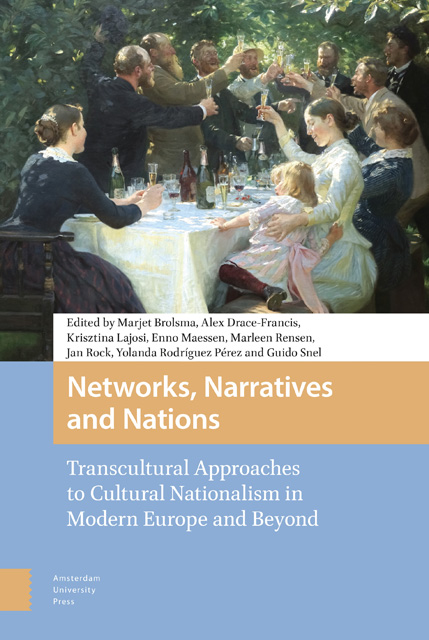 Networks, Narratives and Nations
Networks, Narratives and Nations Book contents
Introduction: Of Networks, Narratives and Nations
Published online by Cambridge University Press: 16 November 2022
Summary
Abstract
Do narratives make nations, and if so, did networks make this happen? The notion that national and other group identities are constructed and sustained by narratives and images has been a widespread postulate for several decades now. This volume contributes to this debate, with a particular emphasis on the networked, transnational nature of cultural nation-building processes in a comparative European and sometimes extra-European context.
Keywords: national identity; cultural nationalism; literary genres; social networks; European identity
Do narratives make nations, and if so, did networks make this happen? The notion that national and other group identities are constructed and sustained by narratives and images has been a widespread postulate in the study of nationalism in Europe and beyond for several decades now. While some, more sociologically oriented theories have seen the creation of national cultures as a mere by-product of large-scale political and economic transformations, others have seen both the content and the form of national narratives as central to the process of creating identities. A large body of literature has now appeared addressing questions of nation and narration, whether through edited volumes or monograph studies. This volume contributes to this debate, with a particular emphasis on the networked, transnational nature of cultural nation-building processes in a comparative European and sometimes extra-European context. It stresses the centrality and agency of literary, artistic and cultural practices and modes of representation. In one way or another, literary, cultural and historical narratives and artefacts have shaped national identities. They have done so not just as “content” accompanying a general sociohistorical process but by the specific nature of their means of representation and ways of transmission; and not just within but across linguistic communities.
The objects of study and interpretive methodologies applied in this collection are varied. Chapters deal inter alia not just with poetry, prose and political ideas but with painting, porcelain and popular song. They draw on examples in languages ranging from Icelandic, Arabic and German, to Irish, Hungarian, French and beyond. They study transcultural phenomena from the medieval and early modern periods to the modern and postmodern, with frequent attention to challenging conventional temporalities and periodizations.
- Type
- Chapter
- Information
- Networks, Narratives and NationsTranscultural Approaches to Cultural Nationalism in Modern Europe and Beyond, pp. 13 - 28Publisher: Amsterdam University PressPrint publication year: 2022


